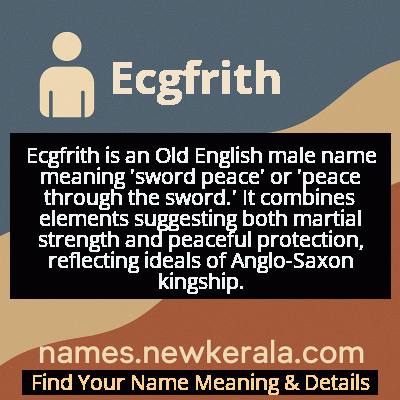Ecgfrith Name Meaning & Details
Origin, Popularity, Numerology Analysis & Name Meaning of Ecgfrith
Discover the origin, meaning, and cultural significance of the name ECGFRITH. Delve into its historical roots and explore the lasting impact it has had on communities and traditions.
Name
Ecgfrith
Gender
Male
Origin
Anglo
Lucky Number
4
Meaning of the Name - Ecgfrith
Ecgfrith is an Old English male name meaning 'sword peace' or 'peace through the sword.' It combines elements suggesting both martial strength and peaceful protection, reflecting ideals of Anglo-Saxon kingship.
Ecgfrith - Complete Numerology Analysis
Your Numerology Number
Based on Pythagorean Numerology System
Ruling Planet
Uranus (Rahu)
Positive Nature
Strong sense of order, loyal, practical, and disciplined.
Negative Traits
Stubborn, overly serious, rigid, and prone to feeling restricted.
Lucky Colours
Blue, gray.
Lucky Days
Saturday.
Lucky Stones
Blue sapphire.
Harmony Numbers
1, 7, 8.
Best Suited Professions
Managers, engineers, accountants, organizers.
What People Like About You
Dependability, discipline, practicality.
Famous People Named Ecgfrith
Ecgfrith of Northumbria
Anglo-Saxon King
Ruled Northumbria during its peak power, engaged in significant military campaigns
Ecgfrith of Mercia
Anglo-Saxon King
Member of the powerful Mercian royal house, ruled briefly in 796
Ecgfrith (son of Offa)
Anglo-Saxon Prince
Designated heir to one of Mercia's greatest kings, featured on royal coinage
Name Variations & International Equivalents
Click on blue names to explore their detailed meanings. Gray names with will be available soon.
Cultural & Historical Significance
Extended Personality Analysis
The name Ecgfrith suggests a personality characterized by strength, protection, and leadership with a strong sense of historical consciousness. Bearers of this name are often perceived as natural leaders who combine strategic thinking with practical action. They typically exhibit a protective nature, feeling responsible for the wellbeing of those in their care, much like the warrior-kings of old who were expected to defend their people. The 'sword' element of the name indicates decisiveness and the ability to confront challenges directly, while the 'peace' component suggests a deeper desire for harmony and stability. Ecgfriths often possess a traditional outlook tempered by innovative problem-solving skills, making them effective in roles that require both respect for established ways and adaptability to new circumstances. They tend to carry themselves with a certain gravitas, aware of the historical weight their name carries, and often feel driven by purposes larger than personal ambition. While they can be formidable when their principles are challenged, they generally prefer to maintain peace through strength rather than conflict for its own sake.
Modern Usage & Popularity
In modern contexts, Ecgfrith is an extremely rare name that exists primarily as a historical artifact rather than a living naming tradition. Its usage is almost exclusively limited to academic circles, historical reenactment communities, and families with specific interests in Anglo-Saxon heritage. The name has never achieved significant popularity in the modern era due to its archaic sound and complex pronunciation for contemporary English speakers. It occasionally appears in historical fiction or as a character name in media dealing with early medieval England, serving as an authentic period-appropriate choice. For families considering the name today, it represents a bold statement of historical connection rather than a conventional naming choice. The name's rarity makes it distinctive but also challenging for daily use in modern society, limiting its appeal primarily to those with specialized interests in early English history or unique naming preferences.
Symbolic & Spiritual Meanings
Symbolically, Ecgfrith represents the ideal balance between martial capability and peaceful governance, embodying the concept of the protector-ruler who maintains order through both strength and wisdom. The sword element symbolizes justice, defense, and the willingness to take decisive action when necessary, while the peace component represents harmony, community, and the creation of stable social structures. This combination speaks to the ancient understanding that true peace is not passive but must be actively defended and cultivated. The name also carries connotations of historical legacy and cultural continuity, linking its bearer to the foundational periods of English history. In a broader sense, Ecgfrith symbolizes the tension and synthesis between power and responsibility, suggesting that true leadership involves both the capacity for action and the wisdom to use that capacity judiciously for the greater good.

